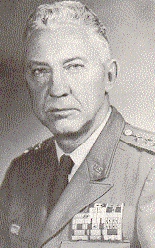
In November, 1969, William Peers, a tough, plain speaking three-star general, was appointed to conduct a thorough investigation into the My Lai incident and its subsequent coverup. Peers received the appointment for several reasons. First, he was stationed at the time in the Pentagon as chief of the Army's reserve forces and national guard, and therefore had no direct command. Second, he was not a West Point graduate and thus could not be accused of being influenced by the Academy's fraternity of officers. Third, he had served in Viet Nam as a commanding general. Fourth, he generally had a reputation for fairness and objectivity. His appointment was generally applauded by military officials, while State Department officials were more skeptical, expressing the concern that Peers had shown an insensitivity to civilian problems while commanding the 4th U. S. Division in Viet Nam.
Peers took on his assignment with a determination to discover the truth. He worked at least six days a week for four months, listening to 398 witnesses and compiling 20,000 pages of testimony. In December, 1969, Peers and his staff flew to Viet Nam and visited My Lai 4. Although at first Peers said he disbelieved the allegations in Ridenhour's letter, he soon came to realize that the truth was even more damning than the letter had suggested. Peers' final report, published in March, 1970, was highly critical of top officers for participation in a coverup and Calley, Medina, and various enlisted officers for their actions at My Lai 4.
Peers was born in Stuart, Iowa in 1914. He was an avid athlete in his youth, playing rugby, football, and wrestling. After graduating from UCLA in 1937, Peers joined the military. He served in Burma during World War II and worked later for the CIA on covert operations against Communist China.
